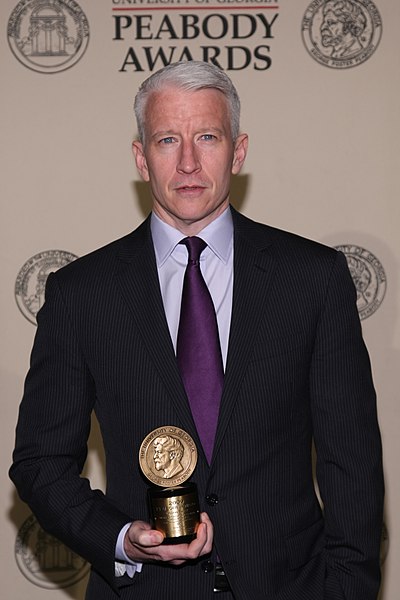Photo by Anders Krusberg at the 2012 Peabody Awards/wikipedia commons
By Taylor Helmes, Staff Reporter
The dangerous distribution of fake news and over-reliance on smartphones, how to handle emotions while reporting amidst death and carnage, and the impact his parents had on his life were the top three subjects CNN anchor Anderson Cooper focused on during a 45-minute lecture in Costa Mesa on Monday evening.
Cooper, an award-winning journalist who has worked at CNN for the past 18 years, discussed serious concerns journalists and readers face, but also lightened the mood with jokes and humor during his lecture, which was part of the Distinguished Speaker Series of Orange County. For instance, when he took the stage after Doug McIntyre, also an award-winning journalist and talk show host, introduced him, Cooper brought attention to his noticeably pale skin and snow-white hair, and how a fan had direct messaged him pointing out the possibility of him being albino.
He didn’t respond to the message, but, “was touched,” someone cared enough to reach out.
Cooper spoke fondly of his mother, Gloria Vanderbilt, and shared a story of when he went to her for advice on what his next career move should be after graduating with a bachelor’s degree in Political Science. After thinking on it for two days, she responded, “Follow your bliss.” Which Cooper did – by getting a fake press pass from a friend.
Cooper reported from war-torn Myanmar, Somalia, and Rwanda at the start of his career as a journalist. After visiting 40-50 countries, he said, violence and death were often the common denominator.
“You can’t allow yourself to become desensitized to their horror,” Cooper explained when asked if he still kept track of the amount of dead bodies he’d seen throughout his career. “Soft eyes,” he said, is what helped him remove bias, personal emotions, and create the story that needed to be told.
Cooper came to California State University, Dominguez Hills in April 2017 for an episode of “60 Minutes” and interviewed Department of Communication Chair Nancy Cheever and psychology professor Larry Rosen about the mental and physical effects smartphone applications have, and how they might influence someone’s behavior. In the segment, Cooper volunteered to be a test subject and experienced physiological symptoms such as changes in heart rate and increased levels of sweat that coincide with anxiety in response to his not being able to access his phone while notifications were popping up.

In his Monday lecture, Cooper touched upon technology and journalism. He said that all the technology journalists have used in the past, such as a camera, audio recorder, video recorder, and a pen and paper can now be found on a smartphone, along with the infinite amount of information at the touch of a finger. Cooper said he “worries about the impact of the information on smartphones,” and urged news consumers to do additional research and fact-check stories.
Those remarks registered with two of the audience members, such as Rob Case and his wife.
Before the lecture, all the couple knew of Cooper was that he was a TV host. But after the lecture, they said the biggest challenges they face listening to the news is “deciphering what is accurate and true, and what’s not,” Rob Case said.
” Like [Cooper] said, when people speak, they think that they’re the truth and they discount whatever somebody may think that is contrary to what they think.”

